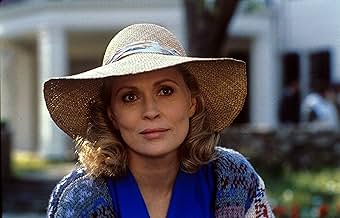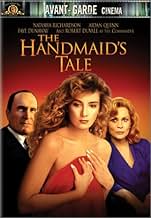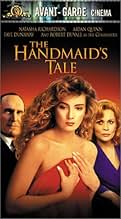CALIFICACIÓN DE IMDb
6.0/10
12 k
TU CALIFICACIÓN
En una sociedad tiránica altamente contaminada, una joven es usada como esclava sexual a causa de un raro don, su fertilidad.En una sociedad tiránica altamente contaminada, una joven es usada como esclava sexual a causa de un raro don, su fertilidad.En una sociedad tiránica altamente contaminada, una joven es usada como esclava sexual a causa de un raro don, su fertilidad.
- Dirección
- Guionistas
- Elenco
- Premios
- 2 premios ganados y 1 nominación en total
Reiner Schöne
- Luke
- (as Rainer Schoene)
Robert D. Raiford
- Dick
- (as Robert Raiford)
- Dirección
- Guionistas
- Todo el elenco y el equipo
- Producción, taquilla y más en IMDbPro
Opiniones destacadas
There's nothing subtle about this screen adaptation of Margaret Atwood's cautionary fable, but the premise is nothing if not provocative: in a repressive fundamentalist dictatorship (called Gilead, but ostensibly America in the near future) the few remaining fertile women are forced to bear children, in effect becoming sexual servants to the (male) powers-that-be. Gilead may be colored red, white and blue, but there's more than a passing resemblance to Orwell's Oceana; even the act of conception is reduced to a ritual, with the euphemism 'ceremony' doubling for intercourse. A talented cast does its best with Harold Pinter's typically inscrutable screenplay, but under Volker Schlondorff's dispassionate direction the film never achieves a convincing level of oppression or paranoia. Worse, it lacks a story to match its scenario; the handmaid Offred's redemption is achieved only with the help of another man, which seems to deflate the feminist slant. The final result is nowhere near a successful movie, but never less than a fascinating failure.
This movie is about what can happen when religious nuts take over the country's government. People who are different are either killed or enslaved in one way or another. Let's see...we have murder and public display of anyone who isn't of the religion that took over....women who are fertile enslaved for religious higher-up's in the government...anyone who's different, and ISN'T killed enslaved in radioactive areas...makes you realize why people fight so hard against religion intruding into politics. Like the scholars from the future of this story who have a hard time believing it actually happened, despite hearing the story with their own ears, people nowadays don't believe that "people of God" in government would be so bad. Watch this movie and think on it. This is why there's a separation of church and state.
I have just one point to make about this film, and that is why on earth did the director decided to name Offred kate. In the book, which I hope to god the producers etc actually read, there is no mention of the name kate what so ever, the only name that we could possibly guess would be June which is supplied to us in the first chapter but even then we never learn her real name. And this is of great significant importance, the fact that we as readers or viewers never learn her name means something and to simply choose a name out of a hat is destroying a piece of the character created for us by Margaret Attwood. Also reading the plot outline makes me wonder whether whoever wrote that even saw the film, especially where it says "Kate is a criminal, guilty of the crime of trying to escape from the US, and is sentenced to become a Handmaid." when really "KATE" becomes a handmaid as her husband was married once before and their marriage never really existed in the eyes of the law. Also i read on to see that "After ruthless group training by Serena Joy in the proper way to behave, Kate is assigned as Handmaid to the Commander." Well that is not at all true as anyone who has seen this film will notice that Serena Joy is the commanders wife and not one of the Aunts and the Red Centre. Please in the future get your facts right and also thanks to director Volker Schlöndorff for ruining a perfectly enjoyable book. My advice stick to the book and not the watered down version for the small minded.
Margaret Atwood, a Canadian novelist (and poet) wrote the dark fantasy novel on which this film is based. It is set in The Republic of Gilead, formerly the United States, or at least the parts of it that are not radioactive. The radioactive parts are called the colonies, where bad girls are sent to die of radiation poisoning. The time is the near future, after the inevitable nuclear war, and the breakdown of government as we know it.
The society depicted in The Handmaid's Tale is a nightmare: everyone is watched by the Eyes, unknowable, unseen government spies. Women are forbidden to have jobs. They are irrevocably assigned to classes. At the top are the chaste, but morally superior, Wives, almost all of whom have been rendered infertile by the inevitable unclear war. At the bottom are the housekeepers, or Marthas, who are non-entities. In the middle are the Handmaids of the title, who are fertile, but tightly controlled. The term Handmaid is a Biblical term that is used in the Old Testament stories of Abraham, Sarah, Jacob and Rachel. In the Bible, the wives gave their handmaids to their husbands in order to produce heirs.
Handmaids, in the film and the book, are forced to have sex with the Commanders, the husbands of the Wives. During this sex, the Wives are intimately present to take in any "love" their Commanders have to give.
The Handmaids are trained to remain unattached to the Commanders. They are prohibited from using makeup or doing anything to make themselves attractive. Handmaids are forced to turn their offspring over to the morally "fit" Wives.
Robert Duvall, a Commander in whose home Offred is placed, gives a family Bible reading performance that will curdle the blood of true people of faith. It is a breathtaking, heart-stopping performance.
The government is totalitarian and monotheistic. The one god is very strict, and has His Eyes everywhere.
Offred, who was once known as Kate, is a Handmaid who, despite her training (read brainwashing), recalls her past, her loving husband, and her adored daughter. She tells with sparkling, and terrifying clarity, how the society came to be the way it is.
This governmental aspect of the story is instructive, however, they are almost totally absent in the film.
Offred's/Kate's personal story is heartrending. It reminds one of the miseries of, say, the women of Darfur. When the government breaks down, she and her husband and daughter attempt to flee to Canada. Unfortunately, they are caught. Her daughter is "confiscated." Her husband is taken away. She never sees her husband again.
Offred's training is not as extensively portrayed in the film as it is in the book, but her feeling of terror and helplessness are palpable, in an exquisite performance by Natasha Richardson. Warning, blood is shown.
As we ride down the slippery slope toward the overturning of Roe v. Wade, this film is a must see for those who still care about women's rights.
The society depicted in The Handmaid's Tale is a nightmare: everyone is watched by the Eyes, unknowable, unseen government spies. Women are forbidden to have jobs. They are irrevocably assigned to classes. At the top are the chaste, but morally superior, Wives, almost all of whom have been rendered infertile by the inevitable unclear war. At the bottom are the housekeepers, or Marthas, who are non-entities. In the middle are the Handmaids of the title, who are fertile, but tightly controlled. The term Handmaid is a Biblical term that is used in the Old Testament stories of Abraham, Sarah, Jacob and Rachel. In the Bible, the wives gave their handmaids to their husbands in order to produce heirs.
Handmaids, in the film and the book, are forced to have sex with the Commanders, the husbands of the Wives. During this sex, the Wives are intimately present to take in any "love" their Commanders have to give.
The Handmaids are trained to remain unattached to the Commanders. They are prohibited from using makeup or doing anything to make themselves attractive. Handmaids are forced to turn their offspring over to the morally "fit" Wives.
Robert Duvall, a Commander in whose home Offred is placed, gives a family Bible reading performance that will curdle the blood of true people of faith. It is a breathtaking, heart-stopping performance.
The government is totalitarian and monotheistic. The one god is very strict, and has His Eyes everywhere.
Offred, who was once known as Kate, is a Handmaid who, despite her training (read brainwashing), recalls her past, her loving husband, and her adored daughter. She tells with sparkling, and terrifying clarity, how the society came to be the way it is.
This governmental aspect of the story is instructive, however, they are almost totally absent in the film.
Offred's/Kate's personal story is heartrending. It reminds one of the miseries of, say, the women of Darfur. When the government breaks down, she and her husband and daughter attempt to flee to Canada. Unfortunately, they are caught. Her daughter is "confiscated." Her husband is taken away. She never sees her husband again.
Offred's training is not as extensively portrayed in the film as it is in the book, but her feeling of terror and helplessness are palpable, in an exquisite performance by Natasha Richardson. Warning, blood is shown.
As we ride down the slippery slope toward the overturning of Roe v. Wade, this film is a must see for those who still care about women's rights.
I'm surprised by some of the negative comments on this film. In my opinion, it represents the best kind of literary adaptation that the cinema offers: One in which the screenwriter and director clearly remained faithful to the spirit of the book without attempting to reproduce it. How can you go wrong with a Margaret Atwood book, a Harold Pinter screenplay and Volker Schlöndorff's direction? Some have suggested that the film suffered from "wooden" acting. Personally, I thought it was a fantastic cast: Robert Duvall and Victoria Tennant at their evil best; Faye Dunnaway as the "defeated" wife; Elizabeth McGovern as saucy as ever; Aidan Quinn and Natascha Richardson in the necessarily bland roles that drive the narrative. What holes here?
Commercial film doesn't get any better. "The Handmaid's Tale" is a dark portrait of a world unlike ours and yet so much like ours... in which a right-wing, bureaucratic patriarchy dominates the land. Women have three main functions (for which their clothing is color coded): Red for the handmaids, who are walking wombs; white for the innnocent children; blue for the sterile trophy wives. Brown is worn by the "aunts", a futuristic equivalent of the Sonderkomando (i.e., Jews who worked on behalf of the Nazi's in the death camps), evil schoolmistress types who both train/brainwash young women for assignment and occasionally destroy them. A fifth function, for which the garb is particularly interesting, is "working" in Gilead's underground social club (essentially a den of iniquity, rife with prostitution and drugs.) Point is... by splitting up these functions, hasn't Atwood described the basic roles that women play within our own male-dominated society, in various different permutations and combinations? To the patriarchy, women are mothers, models, sluts, angels and, when professionals, they are not to aspire to more teaching posts. In Gilead, the lines are clearer; in our own society, aren't most women "supposed to" play some combination of all of these roles?
I get the feeling that most moviegoers are looking for something else in "sci-fi." Here's a new plot twist: The rebels feed Kate some kind of medication that allows her to read the commander's mind while destroying his brain. Wait... that's "Scanners." Oops. Seriously, two of the reviews on this site made spedific mention of Schlöndorff's "horrible", "atrocious" directorial skills. Ahem. Perhaps before they weigh in on the auteur, they ought to see "Young Törless", "Coup de grâce", "The Tin Drum" and all of his other wonderful efforts. As a matter of fact, to insinuate that someone who could bring Grass' Tin Drum to the screen in such a stunning fashion is a lousy director is PREPOSTEROUS. Schlöndorff is a giant of the New German Cinema, and it underscores the ignorance of the Hollywooders when they cast such baseless aspersions.
Commercial film doesn't get any better. "The Handmaid's Tale" is a dark portrait of a world unlike ours and yet so much like ours... in which a right-wing, bureaucratic patriarchy dominates the land. Women have three main functions (for which their clothing is color coded): Red for the handmaids, who are walking wombs; white for the innnocent children; blue for the sterile trophy wives. Brown is worn by the "aunts", a futuristic equivalent of the Sonderkomando (i.e., Jews who worked on behalf of the Nazi's in the death camps), evil schoolmistress types who both train/brainwash young women for assignment and occasionally destroy them. A fifth function, for which the garb is particularly interesting, is "working" in Gilead's underground social club (essentially a den of iniquity, rife with prostitution and drugs.) Point is... by splitting up these functions, hasn't Atwood described the basic roles that women play within our own male-dominated society, in various different permutations and combinations? To the patriarchy, women are mothers, models, sluts, angels and, when professionals, they are not to aspire to more teaching posts. In Gilead, the lines are clearer; in our own society, aren't most women "supposed to" play some combination of all of these roles?
I get the feeling that most moviegoers are looking for something else in "sci-fi." Here's a new plot twist: The rebels feed Kate some kind of medication that allows her to read the commander's mind while destroying his brain. Wait... that's "Scanners." Oops. Seriously, two of the reviews on this site made spedific mention of Schlöndorff's "horrible", "atrocious" directorial skills. Ahem. Perhaps before they weigh in on the auteur, they ought to see "Young Törless", "Coup de grâce", "The Tin Drum" and all of his other wonderful efforts. As a matter of fact, to insinuate that someone who could bring Grass' Tin Drum to the screen in such a stunning fashion is a lousy director is PREPOSTEROUS. Schlöndorff is a giant of the New German Cinema, and it underscores the ignorance of the Hollywooders when they cast such baseless aspersions.
¿Sabías que…?
- TriviaWhile working on the film, Robert Duvall became so fascinated with evangelism that it inspired him to write The Apostle (1997).
- ErroresWhen Moira ties up Aunt Lydia and escapes the Red Center, it is late at night, but moments later, when she exits, it is clearly daytime.
- Bandas sonorasWhispering Hope
Written by Septimus Winner as Alice Hawthorne
Selecciones populares
Inicia sesión para calificar y agrega a la lista de videos para obtener recomendaciones personalizadas
- How long is The Handmaid's Tale?Con tecnología de Alexa
Detalles
- Fecha de lanzamiento
- Países de origen
- Sitio oficial
- Idioma
- También se conoce como
- The Handmaid's Tale
- Locaciones de filmación
- James Adams Buchanan House, 1810 Cedar St, Durham, Carolina del Norte, Estados Unidos(Commander Fred's house)
- Productoras
- Ver más créditos de la compañía en IMDbPro
Taquilla
- Total en EE. UU. y Canadá
- USD 4,960,385
- Fin de semana de estreno en EE. UU. y Canadá
- USD 738,578
- 11 mar 1990
- Total a nivel mundial
- USD 4,960,385
- Tiempo de ejecución1 hora 49 minutos
- Color
- Mezcla de sonido
- Relación de aspecto
- 1.85 : 1
Contribuir a esta página
Sugiere una edición o agrega el contenido que falta

Principales brechas de datos
What is the Hindi language plot outline for El cuento de la doncella (1990)?
Responda


































